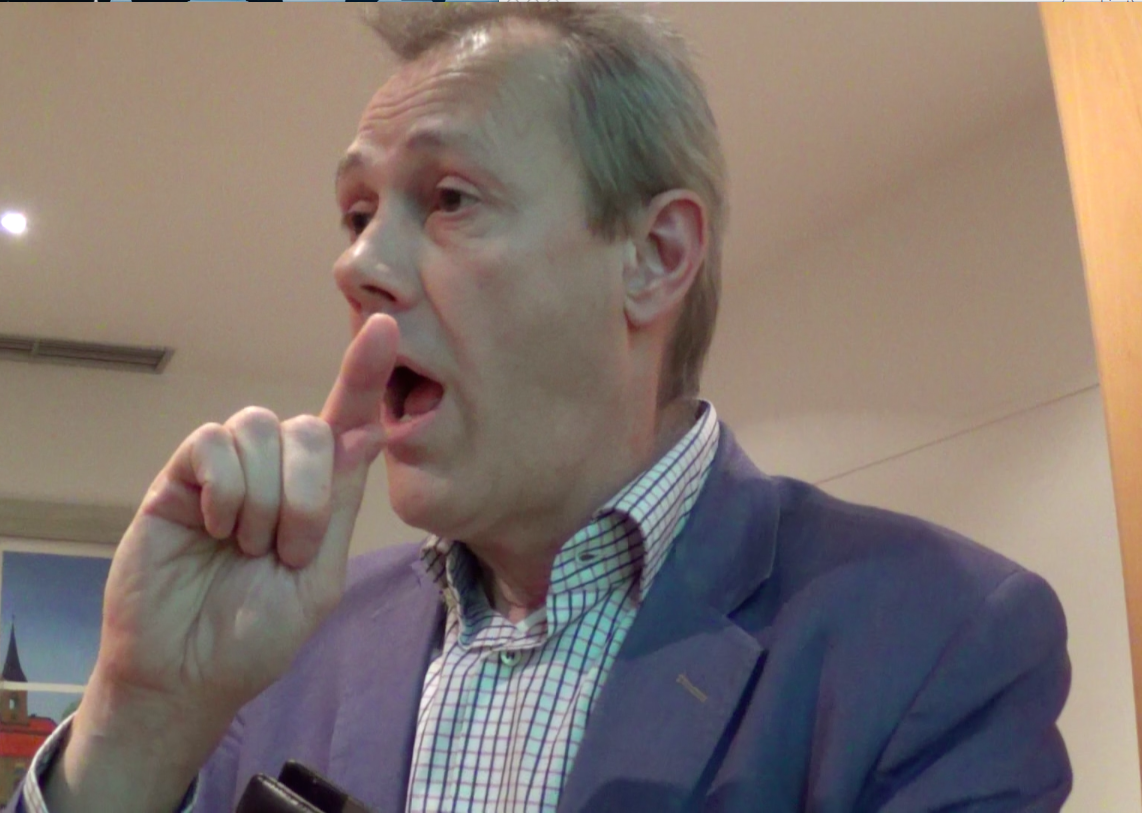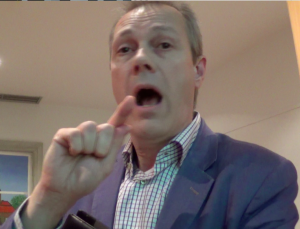
A team from the independent radio station Radio Free Sarawak (RFS) last week confronted the Belgian broadcast agent, who has been implicated in jamming their programmes.
Ludo Maes supplies short wave antennae and transmitters from his business near Antwerp and acts as a broker for radio stations looking for shortwave broadcast slots across the world.
However, Sarawak Report (a sister organisation to RFS) has now obtained extensive evidence confirming that Mr Maes is also involved in radio jamming.
Confronting Ludo Maes Click Here
In 2011 Maes was the agent who booked a Russian based transmission that deliberately interfered with RFS broadcasts during the state election campaign period.
As a key supplier of jamming equipment he is also a strong suspect for the continuing local jamming, currently taking place against the station and other independent radio stations elsewhere.
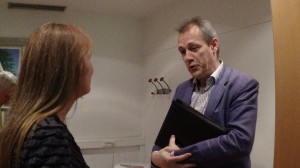
Caught selling
RFS took their opportunity to surprise Mr Maes as he exited a meeting in Brussels, which unbeknown to him had been organised by the radio station.
At this meeting he had agreed to sell jamming equipment to agents for an African country, after being told that ‘the powers that be’ in that country wished to disrupt a ‘troublesome’ radio station.
Even though he had set out to establish that everything he does is “100% legal”, Mais soon consented to supply transmitters and antennae potentially worth millions of dollars to a reporter, who was posing as a client wishing to jam another station covertly on behalf of a pro-government entity – a situation identical to the attacks on RFS.
Hear the Jamming on RFS Click here:
Furthermore, Maes went on to offer to advise on how to design the the equipment to be “as effective as possible” for the purpose required and to “project manage” the entire enterprise.
“”All the things we do are 100% legal and Interfering with another station on purpose, its illegal”, Mais had said. “But if you ask me can I supply the equipment, small broadcast equipment that can be used for that purpose? Of course, the answer is yes. I cannot predict what people are going to do with it. If they use the same frequency as another station, that’s not my problem. That’s not my responsibility”
And yet, when then challenged by the RFS camera crew, Ludo Maes sheepishly denied that he has ever had anything to do with jamming and he claimed the radio station could not prove its allegations that he had been involved in disrupting RFS:
“We are not jamming any radio station at all, of course not… we are selling radio broadcast equipment to different organisations. For what purpose it is used, if it is used for jamming or not, that is something we have no control over. “If you think you have evidence show it, but I say it cannot be true”, claimed Mr Maes.
[vimeo 109809268 w=640]
The evidence
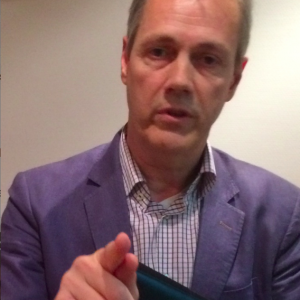
Mr Maes repeated several times when questioned that jamming rival transmissions (either using local jamming equipment or by transmitting on the same frequency or one near by from another country) is illegal under international regulations.
But he continuously denied that he does these things himself and challenged RFS to publish the evidence, something we are now happy to do.
After all, in 2011, Mr Maes’s then company TDP was officially registered as the client, which requested a transmission on the same frequency as RFS during the Sarawak state elections, via Vladivostok in Russia.
Furthermore, as recently as July 2014 a senior member of the Russian Ministry of the Interior acknowledged, when questioned, that Ludo Maes was behind that deliberate jamming attack.
In an email to RFS’s own broadcaster he twice identified Ludo Maes by name:
“I allowed to use frequency from Irkutsk for Ludo Maes. Ludo Maes created hindrances for FCC in Malaysia when there were prezidenstky elections”, the official Alexsey Vesnin admitted.
This incident took place in April 2011 and the public data on TDP’s frequency registration is available from the body that is tasked by the International Telecommunications Union (ITU) to co-ordinate transmissions (the so-called High Frequency Coordination Conference/ HFCC).
The ITU itself comes under the United Nations and is in charge of managing world broadcasting regulations, which prohibit the deliberate disruption of rival transmissions:

The HFCC/ITU data clearly shows that on April 14th 2011, just before the disruption to RFS broadcasts began, TDP, a company owned by Mr Maes, was officially registered by the Russian broadcasting authority (the Federal Communications Ministry’s General Frequency Centre (GFC)) for a transmission from Vladivostok on a frequency that conflicted with Radio Free Sarawak’s existing programme.
This notification confirmed that TDP would be broadcasting on 15425kHz at the exact same time and place as RFS, which was already transmitting on 15420kHz, an insignificant distance away.

This so-called collision was soon picked up by the HFCC, which in turn alerted the US Government’s Federal Communications Commission (FCC) to the violation.
RFS had registered its own broadcast through the the FCC and was duly informed and immediately complained to the Russian authorities, who eventually complied with the rules and terminated Mr Maes’s broadcasts.
He paid up front and wanted to be on the exact same wavelength
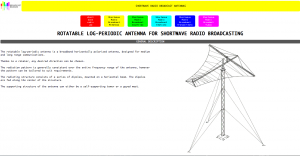
Ludo Maes’ jamming of RFS has therefore been clearly recorded in the official available data, published by the HFCC.
Moreover, enquiries by RFS have confirmed that it was all entirely deliberate on his part. Other Russian insiders at the General Frequency Centre have confided that Maes paid several months up front for the transmission slot, which industry experts estimate would have cost his Malaysian clients over a hundred thousand US dollars for six months of broadcasting costs.
The sources also say that Maes had originally requested that the Russians broadcast a Dance Music station, recently launched by TDP, on exactly the same frequency as RFS. However, he was persuaded to move to a frequency just 5kHz away to make the jamming “less obvious”:
“We contacted the Russians who told us TDP had come to them and asked to broadcast loud dance music on 15420. They said at the time when we called they knew it was a collision and realised it was purely intended to jam RFS. TDP offered to pay for many months in advance, so the Russian radio company then responsible for foreign leasing accepted it, but asked that there should be a small move of frequency to 15425 so the jamming intent was not so obvious. “The Russians also said they spent some time doing trials from Irkutsk and Vladivostok to try to get the optimal signal in Sarawak. “Ironically when RFS originally approached the Russians about using one of their transmitters they had refused, saying they do not broadcast ‘clandestine stations’. But when asked about taking on TDP they said ‘it was just music and no politics.” [RFS’s Broadcast Agent]
Yet Ludo Maes repeated to deny this when confronted by RFS last week:
“All that we are doing is perfectly legal, we are not into radio jamming whatsoever. Jamming is wrong, it is not allowed according to international laws”.
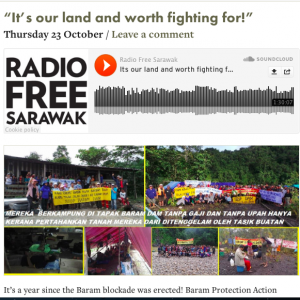
Identified by name
This is despite the fact that we told Maes that he had even been named by the Russian authorities.
As recently as July of this year, a senior Russian official from the Ministry of the Interior, whom we have identified as the frequency manager Alexsey Vesnin, emailed RFS’s own broadcast agent, acknowledging that the jamming incident took place and naming Ludo Maes as the instigator.
In an email, dated 20th July 2014, this official specifically identified Mr Maes twice by name and refers to the ‘Prezidenstky elections’ as the occasion for the jamming.
We have a copy of that email:
From: [email protected] Sent: 20 July 2014 09:55 Re: Collision on 15425kHz 1100-1230UTC
“…a few years ago I had problems from this that in a hurry I allowed to use frequency from Irkutsk for Ludo Maes [sic]. Ludo Maes created hindrances for FCC in Malaysia when there were prezidenstky elections.”
The FCC is the US Federal Communications Commission, the authority responsible for frequencies used by the transmission station that was being utilised by RFS and which had complained to the Russian authorities about the 2011 violation.
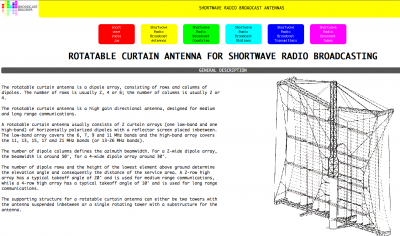
The Russians now say they stopped the practice after these complaints were made and they say that they are no longer aware of any on-going long distance jamming from their territory.
However, Radio Free Sarawak continues to suffer regular disruption and the evidence now suggests that much of this is being carried out by local jamming equipment erected in Sarawak itself.
Sarawak insiders have told RFS that engineers from the Taib family’s own private radio station, Cats Radio (the only independent radio station to have been allowed a licence in Sarawak) are being used to manage this jamming equipment.
Jamming equipment for sale
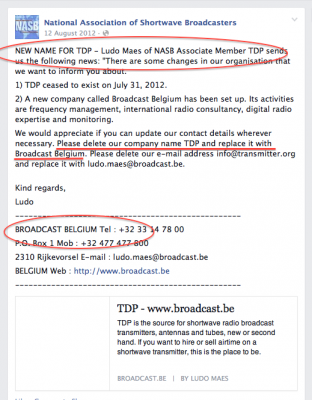
Broadcast Belgium, which is the new name of the company run by Ludo Mais, is a major supplier of this form of equipment, including transmitters and antennae, which can be used to interrupt shortwave broadcasts in surrounding areas.
In fact, industry experts say there are few obvious requirements for the equipment Broadcast Belgium sells – apart from jamming.
One experienced professional commented to Sarawak Report:
“I do not believe there is currently a market for the sort of low power shortwave transmitters he [Maes] sells, except to be used for local jamming on the ground. In general FM is now being installed for domestic radio services not shortwave”.
Mr Maes has also become an expert in the form of jamming that is currently most disrupting RFS broadcasts, which is a loud electronic noise. Another radio expert told RFS:
“When Mais created TDP it caused a some questioning as to why a station should just play continuous loud dance music. Who pays for it, what’s its purpose. It was a mystery. Later he became a involved in DRM (digital shortwave) the unsuccessful system of broadcasting digitally on shortwave. He is now the person who travels the world promoting it. He started transmitting TDP in digital form and this gave him the opportunity to have another effective method of jamming by transmitting loud noise. This loud noise now covers many pro democracy stations in the Horn of Africa.”
Click to hear the current jamming on RFS
Interestingly, Mr Maes referred to the jamming in the Horn of Africa when he was discussing the matter with the fake client put up by RFS.
Asked if he would be able to assist in disrupting a troublesome radio station for an African government he first said “interfering with another station on purpose is illegal”, but then immediately added:
“Not my problem… or responsibility”
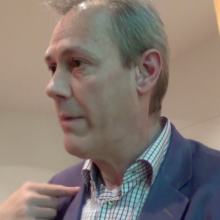
To the contrary RFS insists that Ludo Maes is entirely responsible for this highly lucrative business, since he knows exactly what his products will be used for.
The sting
Radio Free Sarawak had posed as a customer, representing a shadowy organisation in an un-named African country, in order to flush out Mr Maes’s covert activities.
The ‘client’ signalled he wished to discuss a “substantial broadcasting project”, but mysteriously indicated he preferred not to discuss any details before meeting Maes in person.
Ludo nevertheless agreed to attend, subject to one major provision, which turned out to be a written confirmation that the client would be able to pay up front for his services:
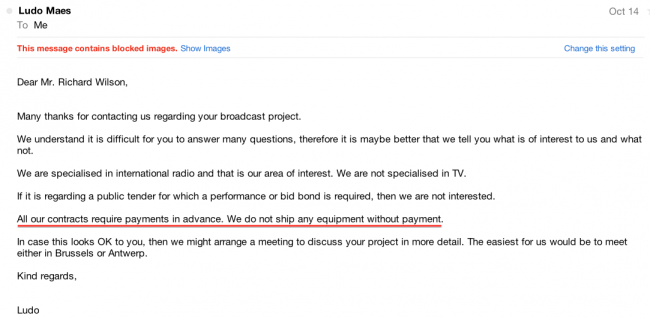
When the meeting started the RFS ‘buyer’ immediately made clear that his employers were interested in ‘disrupting’ a rival ‘troublesome’ radio station, which “has irritated the powers that be” in an unnamed African country and by the end of the meeting Ludo Maes had agreed to meet with the principle players with a view to managing the project.
He had assured the buyer that the equipment could be put in place within some six months and could cover a large country.
And, when the RFS ‘client’ probed on what services Maes could provide, Maes further indicated that he would not only be willing sell the equipment, but could also “project manage” the illegal jamming venture and show his clients how to make the equipment “as effective as possible” for their purpose in mind:
“So you could actually sell them the equipment, you have the equipment to be able to do this?” the reporter enquired.
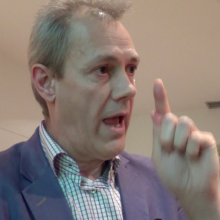
To which Maes replied “With any radio broadcast transmitter…if I am broadcasting on 9015mHz and another station is broadcasting on 9015mHz they will be causing interference to each other…. you can even legally register the same frequency!”
“So you could supply equipment and what they then did with it would be their affair, is essentially what you are saying”? the reporter persisted.
“Yes, we can supply any broadcasting transmitter…. it is our business. The customers that we have are very often pro-democracy organisations.. we have pro-democracy organisations, religious broadcasters, but also governments. That type of customer is quite normal for us .. We can manage a complete project when we know the requirements of the customer: we can advise them on what equipment would be best suited, which set up would be best in order to be as effective as possible. So, we can decide on the delivery of equipment and we can also do the project management”
As the reporter then brought the meeting to a close Mr Maes readily agreed to meet again with the people behind the project, even though it had been clearly established several times that their primary purpose was covert jamming on behalf of an African government.
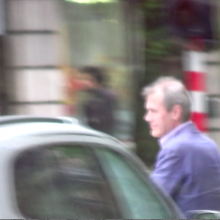
It made his denials all the more surprising when RFS confronted him and asked why he was doing this business and if he felt sorry for the communities who are denied their rights by his jamming.
Sarawak Report believes that his denials were lacking in confidence and in fact untrue.
So, we have in the public interest decided to ignore his angry ‘refusal to grant permission’ for our interview with him to be shown to others.
Decide for yourself on whether Mr Ludo Maes is “100% legitimate” as he claims or just yet another of Taib’s foreign helpers, happy to receive money to assist in the oppression and corruption of the state of Sarawak.

